Our users reported over 96% customer satisfaction for the last 10 years. Schedule a personal tour of our software to see how we can improve your business’s productivity.
Table of Contents
Share Article
The wrong construction accounting software can cost you thousands in lost profits, missed deadlines and compliance headaches.
Because WorkMax® connects seamlessly with today’s leading accounting systems, we put together this expert analysis to cut through the marketing noise and reveal which platforms actually deliver results for your construction business.
Research Statistics:
- 5 software solutions reviewed
- 60+ features analyzed
- 120+ hours of research
The difference between basic bookkeeping software and purpose-built construction accounting software isn’t just features — it’s the difference between guessing at profitability and knowing exactly where your money goes on every job.
The construction industry demands specialized financial management that standard business software simply cannot provide.
Your accounting system must handle project costs, accounts payable, accounts receivable, labor costs and generate detailed financial reports that give you real-time visibility into every aspect of your business.
Our Evaluation Methodology
We evaluated each platform across multiple criteria to ensure comprehensive analysis:
- Job costing capabilities
- Progress billing features
- Equipment management
- Integration options
- Reporting & analytics
- User experience
- Customer support
Top Construction Accounting Software Solutions
#1 FOUNDATION®
Who it’s good for:
- Commercial builders
- Specialty contractors
- General contractors
- Small, medium and large construction firms

Rating: ★★★★★ 4.8/5
(Based on 250+ reviews)
Tagline: America’s #1 Construction Accounting Software
View More

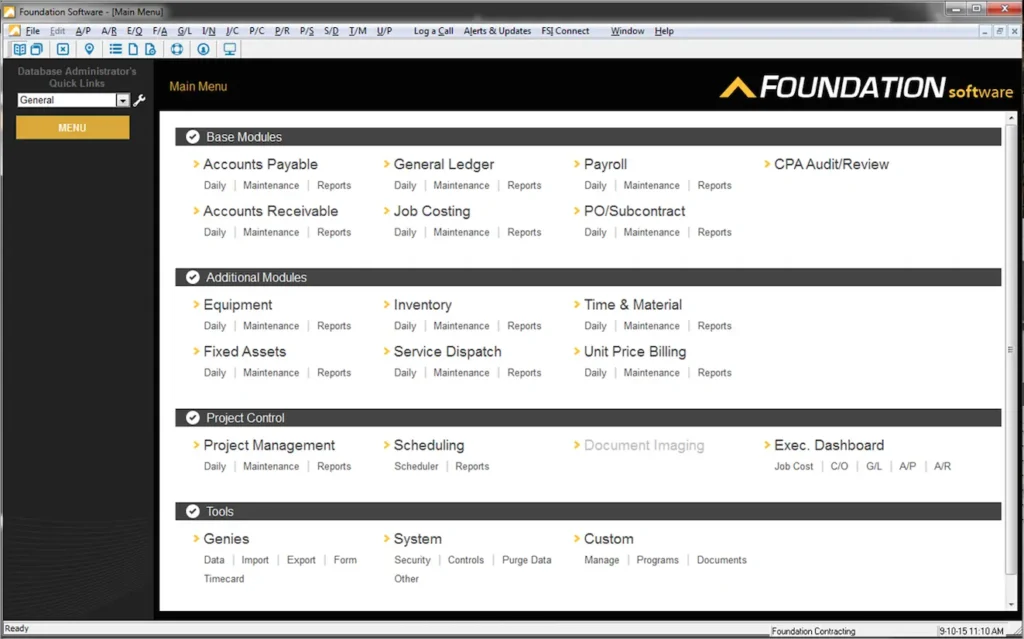
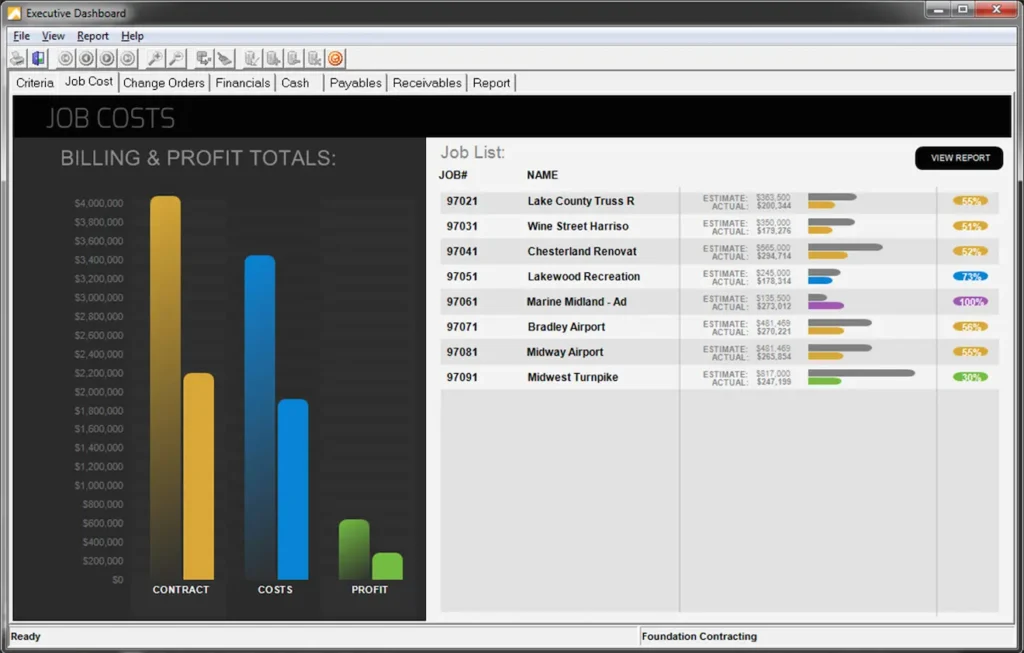
Key features:
- Advanced job costing and cost tracking
- AIA-style billing
- Progress billing
- WIP & cash flow reporting
- Equipment management
- Document management
- Change order tracking
- Payroll processing
- Project management
- Mobile access
- Comprehensive general ledger integration
- Real-time financial data reporting
FOUNDATION stands out as the most comprehensive construction accounting software, built specifically for contractors. With robust job costing, project financial management, labor cost tracking and AP/AR tools — plus seamless integrations for payroll (Payroll4Construction), HR (hrHQ), time tracking (WorkMax) and safety (SafetyHQ) — FOUNDATION keeps compliance, reporting, and project control all in one place without double entry.
Strengths:
- Industry-leading job costing accuracy
- Comprehensive AIA-style billing support
- Exceptional customer support
- Robust reporting capabilities
- Strong integration ecosystem
Considerations:
- Higher learning curve for basic users
- Higher pricing for advanced modules
- May be complex for very small contractors
#2 QuickBooks® Desktop Enterprise – Contractor Edition
Who it’s good for:
- Small to medium contractors
- Construction professionals already familiar with QuickBooks
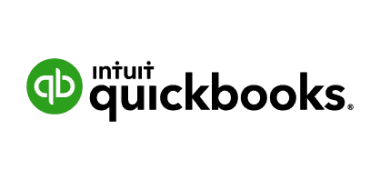
Rating: ★★★★☆ 4.2/5
(Based on 500+ reviews)
Tagline : Stay on top of your contractor business
View More
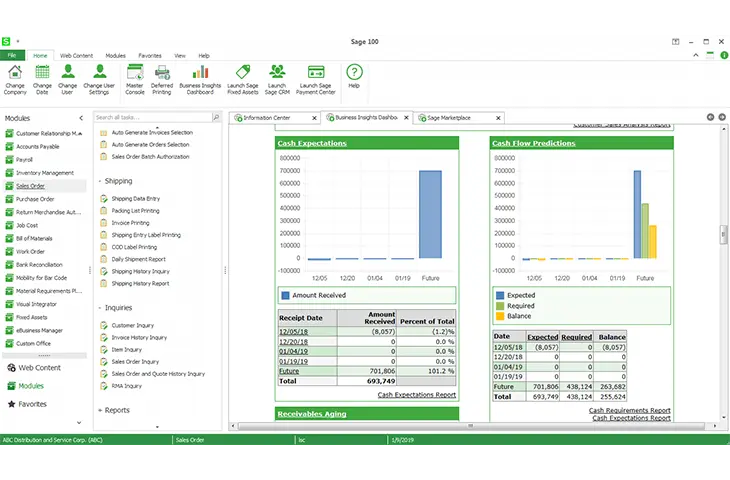
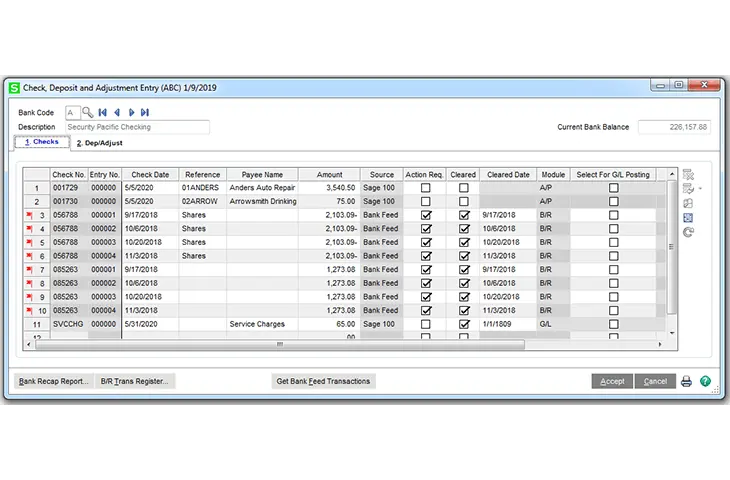
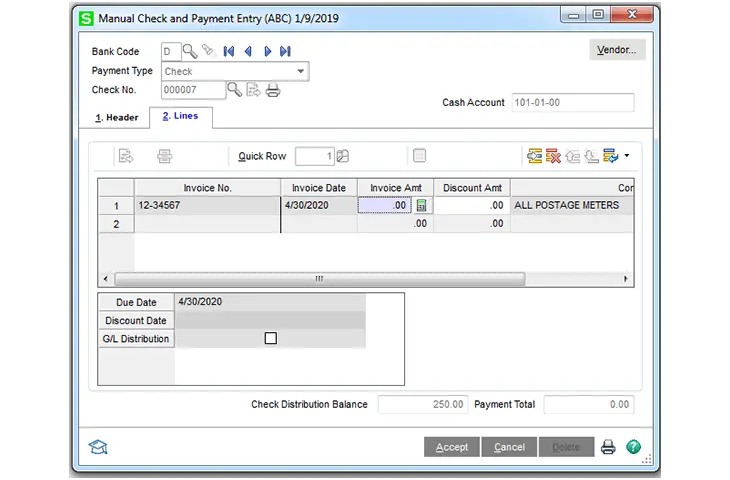
Key features:
- Basic job costing and project costs tracking
- Progress invoicing
- Payroll integration
- Time tracking
- General ledger functionality
A familiar choice for small contractors, QuickBooks Desktop Enterprise – Contractor Edition offers basic construction accounting features within the QuickBooks platform.
Strengths
- User-friendly interface
- Widely known platform
- Good integration options
- Affordable for small businesses
Considerations
- Basic job costing functionality compared to specialized solutions
- Limited advanced construction-specific features
- May require third-party add-ons for complex project cost tracking
#3 Sage 100 Contractor
Who it’s good for:
- Medium to large construction companies

Rating: ★★★★☆ 4.1/5
(Based on 180+ reviews)
Tagline : From construction accounting to operations, our suite has you covered
View More



Key features:
- Job cost management
- Cost tracking
- Financial data processing
- Labor costs analysis
- Financial reports
Sage 100 Contractor is an enterprise solution with construction accounting capabilities. As the upgrade from Sage 50, Sage 100 is designed for larger construction companies seeking financial control and project cost management.
Strengths
- Comprehensive feature set
- Strong for large contractors
- Established market presence
- Good reporting tools
Considerations
- Complex implementation
- High total cost of ownership
- Steep learning curve
#4 Procore
Who it’s good for:
- Medium to large construction companies
- Contractors seeking project management with basic accounting

Rating: ★★★★☆ 4.0/5
(Based on 350+ reviews)
Tagline : Together, we can build it all
View More
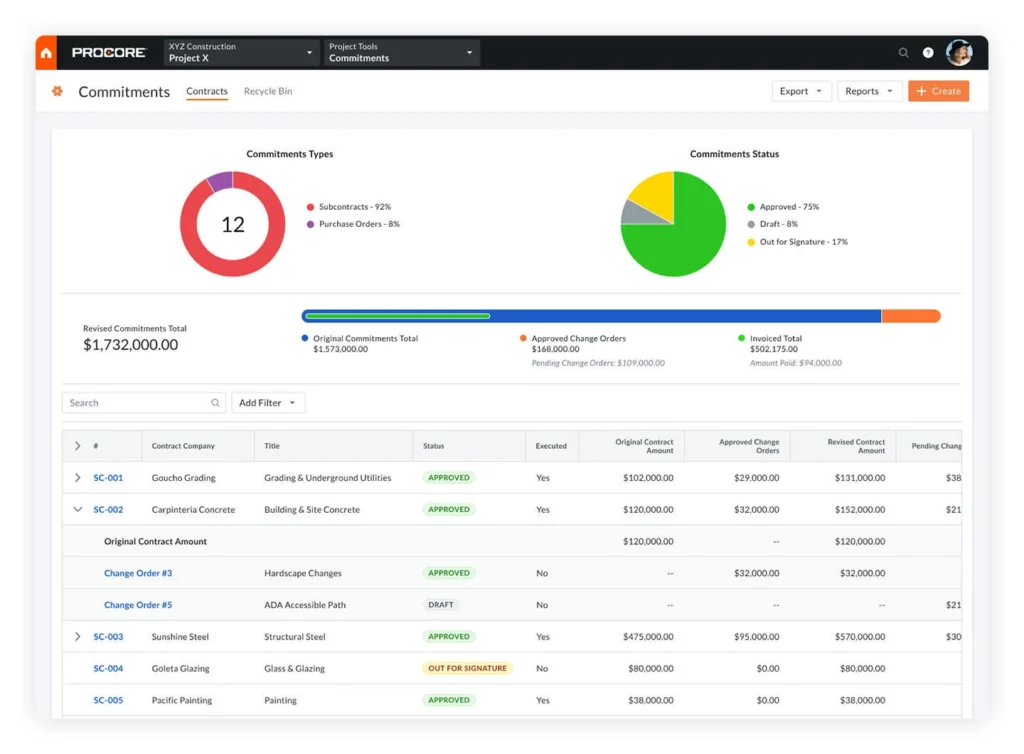
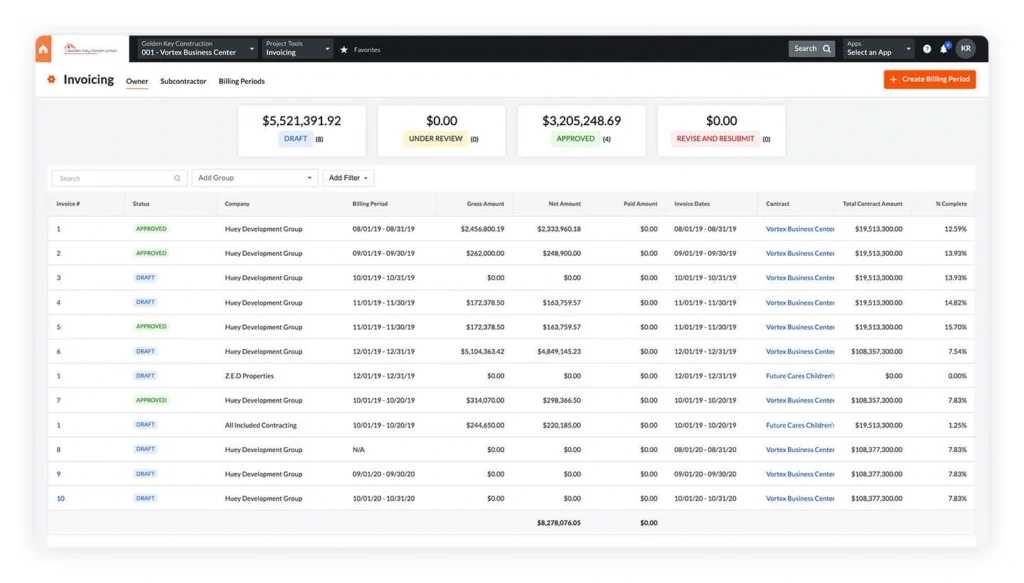
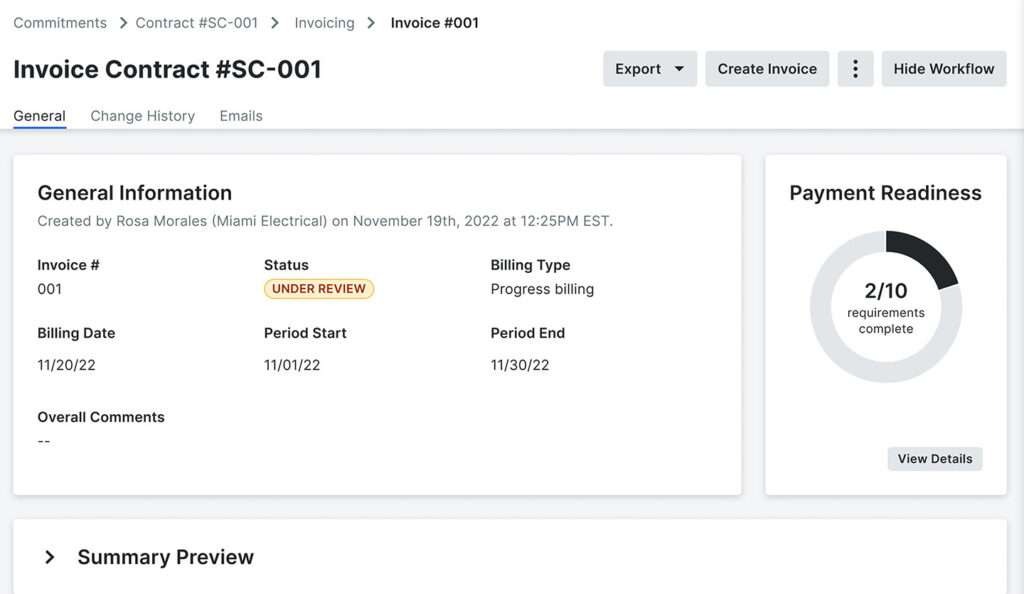
Key features:
- Project management
- Financial management
- Budget tracking
- Change order management
Important Note: Procore is primarily a project management platform with some financial tools and basic construction billing features. However, it lacks the comprehensive accounting depth of dedicated contractor systems, so most firms pair Procore with specialized software for detailed cost tracking and financial management.
Strengths
- Modern interface
- Mobile capabilities
- Project management
- Good collaboration tools
Considerations
- Higher cost structure
- Limited accounting depth compared to specialized solutions
- Requires integration with dedicated accounting software for comprehensive financial management
- Not a replacement for full construction accounting systems
#5 Jonas Construction Software
Who it’s good for:
- Medium to large construction companies

Rating: ★★★★☆ 3.9/5
(Based on 180+ reviews)
Tagline : Jonas Empowers Contractors to Build With Confidence
View More

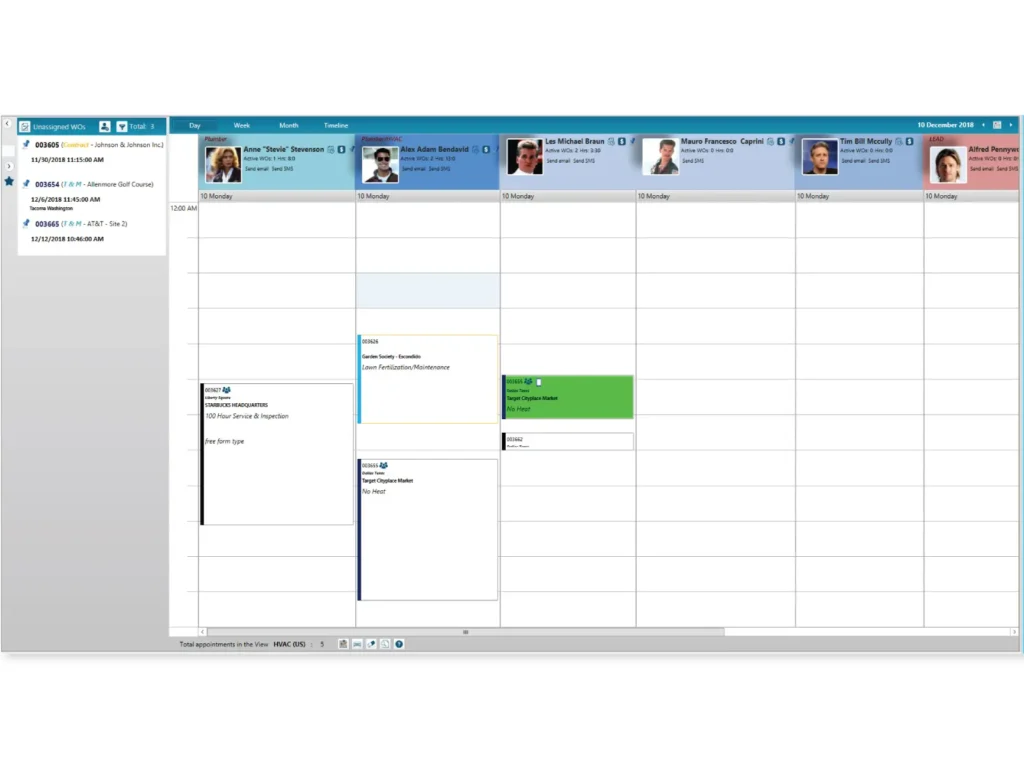
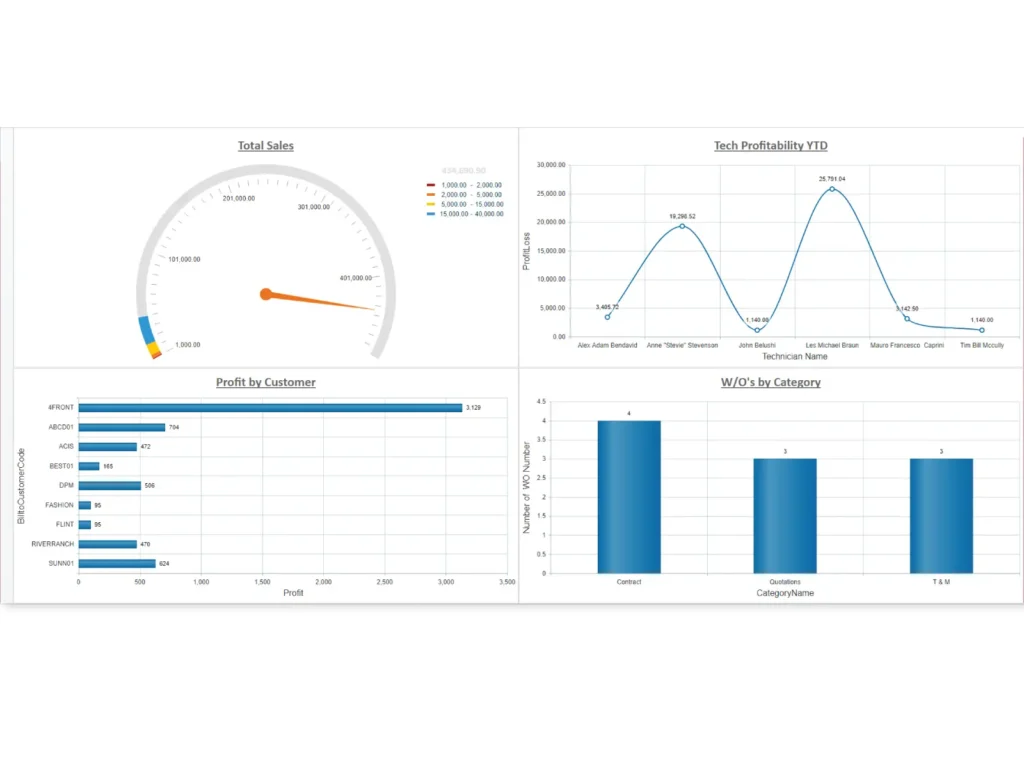
Jonas Construction Software offers accounting software for construction companies. The platform provides financial visibility needed to manage multiple projects simultaneously while maintaining profit margins. The system includes construction billing capabilities and integrates with popular project management software solutions.
Key features:
- Job costing and cost tracking
- Project management integration
- Equipment tracking and management
- Subcontractor management
Strengths:
- Job costing and cost tracking capabilities
- Advanced financial reporting for project profitability analysis
- Integrated accounts payable/receivable management
- Real-time labor costs tracking and allocation
- Strong WIP (Work in Progress) reporting features
Considerations:
- Higher cost compared to basic accounting solutions
- May require additional accounting training for full feature utilization
- Complex financial setup process for multi-project cost allocation
Choosing The Right Accounting Software For Your Business
The right construction accounting software depends on your company size, project complexity and specific financial management needs.
For Small Contractors (1-10 employees)
Recommended: FOUNDATION or QuickBooks Desktop Enterprise
When choosing between these options, consider:
- FOUNDATION offers more construction-specific features and superior job costing with comprehensive cost tracking
- QuickBooks provides a familiar interface with financial data management
For Medium Contractors (11-50 employees)
Recommended: FOUNDATION or Sage 100 Contractor
When choosing between these options, consider:
- Both offer job costing capabilities and financial reports
- FOUNDATION is typically easier to implement and use day-to-day with better construction technology integration
For Large Contractors (50+ employees)
Recommended: FOUNDATION or Procore
When choosing between these options, consider:
- Choose FOUNDATION for superior accounting depth, job costing accuracy and comprehensive labor costs management
- Choose Procore for project costs tracking with some support infrastructure
Key Factors You Should Consider
When evaluating construction accounting software for your business, there are several critical areas you should carefully assess to ensure you make the right choice for your specific needs and circumstances.
Technical Requirements
Your software’s technical foundation determines whether it can grow with your business and integrate with your existing workflow. This makes these infrastructure decisions critical to long-term success.
- Cloud vs. desktop preferences
- Integration needs with existing systems
- Mobile access requirements
- Scalability for business growth
Financial Considerations
Beyond the monthly subscription fee, hidden costs like implementation, training and ongoing support can double your actual investment. This makes total cost analysis essential for accurate budgeting.
- Total cost of ownership
- Implementation and training costs
- Ongoing support expenses
- ROI timeline expectations
Feature Requirements
The depth and sophistication of core accounting features directly impact your ability to track profitability, manage cash flow and make informed business decisions on every project.
- Advanced job costing
- Progress billing
- Equipment tracking
- Reporting and analytics
User Experience
Software that your team won’t adopt is worthless regardless of features. This makes ease of use and support quality often more important than advanced functionality for long-term success.
- Learning curve for your team
- Training requirements
- Support availability
- User adoption factors
Choose the Best Construction Accounting Software for You
Based on our comprehensive analysis, FOUNDATION emerges as the top choice for most construction companies, offering the best combination of specialized construction functionality, advanced job costing capabilities and overall value.
However, the best choice for your company depends on your specific needs, budget and technical requirements. We recommend scheduling demos for your top 2-3 choices and speaking with references before making your final decision.
Frequently Asked Questions
What Makes Construction Accounting Different From Regular Accounting?
Construction accounting requires specialized features like:
- Job costing
- Progress billing
- Retention tracking
- Equipment cost allocation
Unlike general business accounting that focuses on overall company profitability, construction accounting must track multiple profit centers (jobs/projects) simultaneously. Each has individual project costs, labor costs, accounts payable/receivable and profitability metrics.
This complexity requires dedicated contractor accounting software that can handle job-specific financial data and generate detailed cost tracking reports.
How Much Should I Budget For Construction Accounting Software?
Expect to invest $200-$500 per month for comprehensive solutions, plus implementation costs of $5,000-$25,000 depending on complexity and the level of financial data migration required.
Can I Switch From My Current Accounting Software?
Yes, most providers offer data migration services. However, the complexity varies based on your current system and historical financial data requirements.
Cloud-based solutions typically offer more flexible migration options.
What Integrations Are Most Important?
Key integrations include:
- Payroll systems for labor costs management
- Project management tools for cost tracking
- Equipment management systems
- Banking/credit card processing for accounts payable
- General ledger systems for comprehensive financial data reporting
These integrations help streamline your workflow by connecting your accounting software with the other critical systems your construction business relies on daily. The right integrations can eliminate duplicate data entry and provide a more complete view of your project finances.

